- Home
- David Gemmell
Wolf in Shadow Page 2
Wolf in Shadow Read online
Page 2
“Are they hand pistols?” he asked.
“Yes,” said Shannow. “I have had them for seventeen years, but they are much older than that.”
“Do you make your own powder?”
“Yes. I have casts for the loads and several hundred brass caps.”
“Have you killed anyone with them?”
“Eric!” snapped his mother. “That is no question to ask a guest—and certainly not at table.”
They finished the meal in silence, and Shannow helped her clear away the dishes. At the back of the house was an indoor water pump, and together they cleaned the plates. Donna felt uncomfortable in the closeness of the pump room and dropped a plate, which shattered into a score of shards on the tiled wooden floor.
“Please do not be nervous,” he said, kneeling to collect the broken pieces.
“I trust you, Mr. Shannow. But I have been wrong before.”
“I shall sleep outside and be gone in the morning. Thank you for the meal.”
“No,” she said too hurriedly. “I mean, you can sleep in the comfort chair. Eric and I sleep in the back room.”
“And Mr. Taybard?”
“Has been gone for ten days. I hope he will be back soon; I’m worried for him.”
“I could look for him if you like. He may have fallen from his horse.”
“He was driving our wagon. Stay and talk, Mr. Shannow; it is so long since we had company. You can give us news of … where have you come from?”
“From the south and east, across the grass prairies. Before that I was at sea for two years, trading with the ice settlements beyond Volcano Rim.”
“That is said to be the edge of the world.”
“I think it is where hell begins. You can see the fires lighting the horizon for a thousand miles.”
Donna eased past him into the main room. Eric was yawning, and his mother ordered him to bed. He argued as all young people did but finally obeyed her, leaving his bedroom door ajar.
Shannow lowered himself into the comfort chair, stretching his long legs out before the stove. His eyes burned with fatigue.
“Why do you wander, Mr. Shannow?” asked Donna, sitting on the goatskin rug in front of him.
“I am seeking a dream, a city on a hill.”
“I have heard of cities to the south.”
“They are settlements, though some of them are large. But no, my city has been around for much longer; it was built, destroyed, and rebuilt thousands of years ago. It is called Jerusalem, and there is a road leading to it—a black road with glittering diamonds in the center that shine in the night.”
“The Bible city?”
“The very same.”
“It is not around here, Mr. Shannow. Why do you seek it?”
He smiled. “I have been asked that question many, many times, and I cannot answer it. It is a need I carry—an obsession, if you will. When the earth toppled and the oceans swelled, all became chaos. Our history is lost to us, and we no longer know whence we come or where we are going. In Jerusalem there will be answers, and my soul will rest.”
“It is very dangerous to wander, Mr. Shannow. Especially in the wild lands beyond Rivervale.”
“The lands are not wild, lady, at least not for a man who knows their ways. Men are wild, and they create the wild lands wherever they are. But I am a known man, and I am rarely troubled.”
“Are you known as a warmaker?”
“I am known as a man warmakers should avoid.”
“You are playing with words.”
“No, I am a man who loves peace.”
“My husband was a man of peace.”
“Was?”
Donna opened the stove door and added several chunks of wood. She sat for some time staring into the flames, and Shannow did not disturb the silence. At last she looked up at him.
“My husband is dead,” she said. “Murdered.”
“By brigands?”
“No, by the Committee. They—”
“No!” screamed Eric, standing in the bedroom doorway in his white cotton nightshirt. “It’s not true. He’s alive! He’s coming home—I know he’s coming home.”
Donna Taybard ran to her son, burying his weeping face in her breast. Then she led him back into the bedroom, and Shannow was alone. He strolled into the night. The sky was without stars, but the moon shone bright through a break in the clouds. Shannow scratched his head, feeling the dust and grit on his scalp. He removed his woolen jerkin and undershirt and washed in a barrel of clear water, scrubbing the dirt from his hair.
Donna walked out to stand on the porch and watch him. His shoulders seemed unnaturally broad against the slimness of his waist and hips. Silently she moved away from the house to the stream at the bottom of the hill. There she slipped out of her clothes and bathed in the moonlight, rubbing lemon mint leaves across her skin.
When she returned, Jon Shannow was asleep in the comfort chair, his guns once more belted to his waist. She moved silently past him to her room and locked the door. As the key turned, Shannow opened his eyes and smiled.
Where to tomorrow, Shannow? he asked himself.
Where else?
Jerusalem.
Shannow awoke soon after dawn and sat listening to the sounds of morning. He was thirsty and moved to the pump room for a mug of water. Behind the door was an oval mirror framed in golden pine, and he stood staring at his reflection. The eyes were deep-set and dark blue, the face triangular above a square jaw. As he had feared, his hair was showing gray, though his beard was still dark on the cheeks with a silver fork at the chin.
He finished his drink and moved outside to the porch and his saddlebags. Having found his razor and stropped it for several minutes, he returned to the mirror and cut away his beard. Donna Taybard found him there and watched in mild amusement as he tried to trim his long hair.
“Sit out on the porch, Mr. Shannow. I am expecting some friends today, and I think I should make you look presentable.”
With long-handled scissors and a bone comb she worked expertly at the tangled mess, complimenting him on the absence of lice.
“I move too fast for them, and I swim when I can.”
“Is that short enough for you?” she asked, stepping back to admire her handiwork. He ran his hand through his hair and grinned—almost boyishly, she thought.
“That will suffice, Fray Taybard … Donna. Thank you. You said you were expecting friends?”
“Yes, some neighbors are coming over to celebrate Harvest. It was arranged before Tomas … disappeared, but I told them to come anyway. I’m hoping they will be able to help me with the Committee, but I doubt they will … they all have their own problems. You are welcome to stay. There will be a barbecue, and I have made some cakes.”
“Thank you, I will.”
“But Mr. Shannow, please do not wear your guns. This is still, in the main, a peaceful community.”
“As you wish. Is Eric still sleeping?”
“No; he is in the long meadow gathering wood for the fire. And then he must milk the cows.”
“Do you have any trouble with wolves or lions?”
“No. The Committee shot the last lion during the winter, and the wolves have moved to the high country. They sometimes forage in winter, but they are not a great problem.”
“Life here seems … settled,” he said, rising and brushing the hair from his shirt.
“It has been. It certainly was when my father was Prester. But now there is Fletcher; we will not call him Prester, and I know that does not sit well with him.”
“You said last night that your husband was dead. Is that a fear or a reality?”
She stood in the doorway, her hand on the frame. “I have a talent, Mr. Shannow, for seeing faraway things. I had it as a child, and it has not deserted me. As we speak, I can see Eric in the far meadow. He has stopped gathering wood and has climbed a tall pine; he is pretending to be a great hunter. Yes, Mr. Shannow, my husband is dead. He was killed by Fletcher, a
nd there were three with him: the big man, Bard, and two others whose names I do not know. Tomas’ body lies in an arroyo, hastily buried.”
“Fletcher desires your lands?”
“And me. He is a man used to obtaining his desires.”
“Perhaps he will be good for you.”
Her eyes blazed. “You think I will suffer myself to be taken by my husband’s killer?”
Shannow shrugged. “The world is a hard place, Donna. I have seen settlements where women are not allowed to pairbond with a single man, where they are communal property. And it is not strange in other areas for men to kill for what they want. What a man can take and hold, he owns.”
“Not in Rivervale, sir,” she told him. “Not yet, at least.”
“Good luck, Donna. I hope you find a man willing to stand against this Fletcher. If not, I hope he is, as I said, good for you.”
She moved back into the house without a word.
Some time later the boy Eric came into view, towing a small handcart loaded with deadwood. He was a slim boy, his hair so fair that it seemed white. His face was set and serious, his eyes sad and knowing.
He walked past Shannow without speaking, and the man wandered to the paddock, where the steeldust gelding trotted to him, nuzzling his hand. There was grass in the pen, but Shannow would have liked to give him grain. The beast could run for miles without effort, but when fed on grain, he could run forever. Five years earlier Shannow had won two thousand Barta coins in three races, but the gelding was too old now for such ventures. Shannow returned to his saddlebags and removed the oilskin gun pouch.
Pulling the left-hand pistol from its scabbard, he tapped out the barrel pin and released the cylinder, placing it carefully on the porch beside him. Then he ran an oiled cloth through the barrel and cleaned dust from the trigger mechanism. The pistol was nine inches long and weighed several pounds, but Shannow had long since ceased to notice the weight. He checked the cylinder for dust and then slipped it back into place, pressing home the wedge bar and replacing the weapon in its scabbard. The right-hand pistol was two inches shorter and brass-mounted with butt plates of polished ivory, unlike the dark applewood of the longer weapon. Despite the difference in barrel length, it was this weapon that fired true, the other kicking to the left and unreliable at anything but close quarters. Shannow cleaned the pistol lovingly and looked up to see Eric watching him closely, his eyes fixed on the gun.
“Will you shoot it?” asked the boy.
“There is nothing to shoot at,” said Shannow.
“Does it make a loud noise?”
“Yes, and the smoke smells like the Devil. Have you never heard a gun fire?”
“Once, when the Prester shot a lion, but I was only five. Mr. Fletcher has a pistol, and several of the Committee have long rifles; they are more powerful now than any warmaker.”
“You like Mr. Fletcher, Eric?”
“He has always been nice to me. He’s a great man; he’s the Prester now.”
“Then why is your mother afraid of him and his Committee?”
“Oh, that’s just women,” said Eric. “Mr. Fletcher and my father had an argument, and Mr. Fletcher said the carpenter should live in Rivervale, where the work was needed. The Committee voted on it. Mr. Fletcher wanted to buy the farm, but Father said no; I don’t know why. It would be nice to live in Rivervale, where all the people are. And Mr. Fletcher really likes Mother. He told me that; he said she was a fine lady. I like him.”
“Did … does your father like him?”
“Father doesn’t like anybody. He likes me sometimes, when I do my chores well or when I help him without dropping anything.”
“Is he the only carpenter in Rivervale?”
“He was, but Mr. Fletcher has a man working for him who says he’s a carpenter. Father laughs about him; he says the man thinks a dove joint is found on a pigeon’s leg!”
Shannow grinned. The boy looked younger when he smiled.
“Are you a warmaker, Mr. Shannow? Truly?”
“No, Eric. As I told your mother, I am a man who loves peace.”
“But you have guns.”
“I travel through the wild lands, Eric; they are necessary.”
Two wagons crested the skyline. “That will be the Janus family and the McGravens,” said Eric.
Shannow replaced his guns in their scabbards and moved into the house, hanging the weapons on the hook inside the door.
“Your guests have begun to arrive,” he told Donna. The house smelled of fresh-baked bread and cakes. “Is there anything I can do?”
“Help Eric prepare the barbecue fires.”
All morning wagons arrived, until more than twenty formed several lines inside the pasture. With three barbecue fires burning and almost fifty people moving about, Shannow felt uncomfortable. He wandered to the barn for a little solitude and found two young people holding hands in the shadows.
“I am sorry to disturb you,” he said, turning to leave.
“It’s all right,” said the young man. “My name is Janus, Stefan Janus. This is Susan McGraven.” Shannow shook hands with them and moved outside.
As he stood by the paddock, the steeldust gelding ran to him, and Shannow stroked his neck. “Almost time to leave,” he told the horse.
A woman’s voice rang out. “Susan! Where are you?” The young girl ran from the barn.
“I’m coming,” she answered.
The young man joined Shannow; he was tall and fair-haired, and his eyes were serious, his face intelligent.
“Are you staying in Rivervale?”
“No, I am a traveler.”
“A traveler who is uncomfortable with crowds,” observed Janus.
“Even so.”
“You will find the crowd less hostile when the people are known to you. Come, I will introduce you to some friendly faces.”
He took Shannow into the throng, and there followed much shaking of hands and a bewildering series of names that Shannow could not absorb. But the lad was right, and he began to feel more comfortable.
“And what do you do, Mr. Shannow?” came the inevitable question, this time from a burly farmer named Evanson.
“Mr. Shannow is searching for a city,” said Donna Taybard, joining them. “He is a historian.”
“Oh,” responded Evanson, his face portraying his lack of interest. “And how are you, Donna? Any sign of Tomas?”
“No. Is Anne with you?”
“I am afraid not. She stayed with Ash Burry; his wife is not well.”
Shannow slipped away, leaving them to their conversation. Children were playing near the paddock, and he sat on the porch watching them. Everyone here seemed different from the people of the south; their faces were ruddy and healthy, and they laughed often. Elsewhere, where brigands rode, there was always tension, a wariness in the eyes. Shannow felt apart from the people of Rivervale.
Toward the afternoon a group of riders came down the hill, six men riding directly toward the house. Shannow drifted back into the main room and watched them from a window. Donna Taybard saw them at the same time and wandered over, followed by a dozen or so of her neighbors.
The riders reined in, and a tall man in a white woolen shirt stepped from the saddle. He was around thirty years old, and his hair was black and close-cropped, his face dark and handsome.
“Good day, Donna.”
“And to you, Mr. Fletcher.”
“I am glad to see you enjoying yourself. Any word from Tomas?”
“No. I am thinking of going to the arroyo where you left him and marking his grave.”
The man flushed deep red. “I don’t know what you mean.”
“Go away, Saul. I do not want you here.”
People were gathering around the riders, and silence settled over the scene.
Fletcher licked his lips. “Donna, it is no longer safe to be so close to the edge of the wild lands. Daniel Cade has been sighted only eight miles south. You must come into Rivervale.”
/> “This is my home, and I will remain here,” she said.
“I am sorry, but I must insist. The Committee has voted on this. You will be paid handsomely for your home, and comfortable quarters have been set aside for you and Eric. Do not make this any more difficult. Your friends here have offered to help with your furniture and belongings.”
As Donna’s eyes swept the group, Evanson looked away and many others stared at the ground. Only Stefan Janus moved forward.
“Why should she go if she does not wish to?” he said.
Saul Fletcher ignored him and moved closer to Donna.
“There is no sense in this, Donna. The Committee has the right to make laws to protect its people. You must leave, and you will leave. Now!” Fletcher turned to a huge barrel-chested figure on a large black gelding. “Bard, give Donna a hand with her belongings.”
As the big man moved to dismount, Jon Shannow stepped from the shadowed doorway and stood on the porch overlooking the crowd. Bard settled back in the saddle, and all eyes turned to Shannow and the guns he now wore. In turn he studied the men who had just arrived. He had seen men like these all his life: chancers, brigands, warmakers. They all had that look, that stamp of cruelty, of callous arrogance.
“If Fray Taybard wishes to stay,” said Shannow, “then that is the end of the argument.”
“And who are you, sir?” asked Fletcher, his eyes on the pistols at Shannow’s side.
Shannow ignored him and turned to the riders, recognizing two of them.
“How are you, Miles?” he called. “And you, Pope? You are a long way from Allion.” The two men sat very still, saying nothing.
“I asked you who you were,” said Fletcher, his hand resting on the walnut grip of a double-barreled flintlock sheathed at his waist.
“He’s the Jerusalem Man,” said Miles, and Fletcher froze.
“I have heard of you, sir. You are a killer and a warmaker. We will not suffer your kind in Rivervale.”
“No?” said Shannow mildly. “My understanding is that you are no stranger to murder, and Miles and Pope were riding with Cade only a year ago.”
“That is a lie.”
“Whatever you say, Mr. Fletcher. I have neither the time nor the inclination to argue with you. You may leave now.”

 Bloodstone
Bloodstone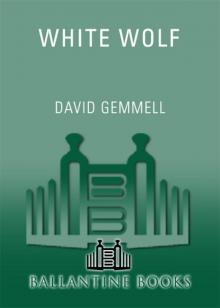 White Wolf
White Wolf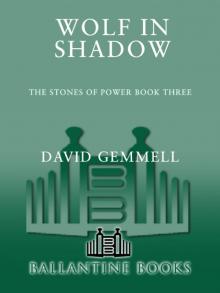 Wolf in Shadow
Wolf in Shadow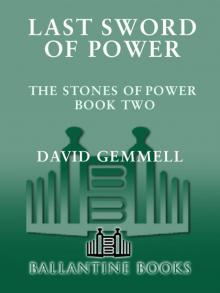 Last Sword of Power
Last Sword of Power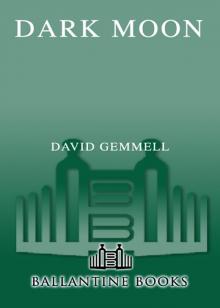 Dark Moon
Dark Moon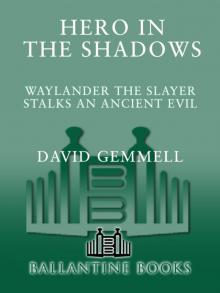 Hero in the Shadows
Hero in the Shadows Gemmell, David - Drenai 09 - Hero In The Shadows
Gemmell, David - Drenai 09 - Hero In The Shadows Waylander
Waylander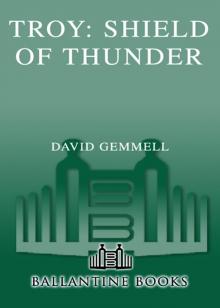 Shield of Thunder
Shield of Thunder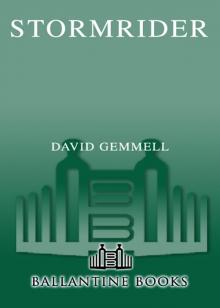 Stormrider Stormrider
Stormrider Stormrider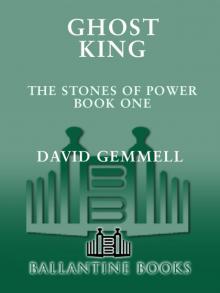 Ghost King
Ghost King Legend
Legend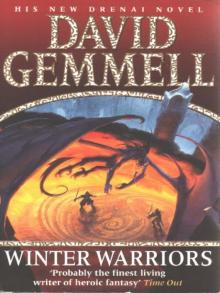 Winter Warriors
Winter Warriors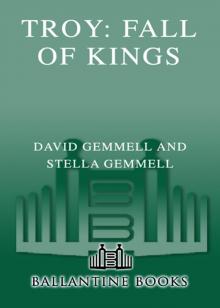 Fall of Kings
Fall of Kings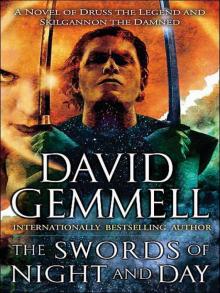 The Swords of Night and Day
The Swords of Night and Day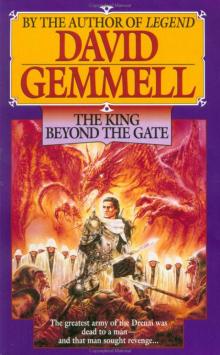 The King Beyond the Gate
The King Beyond the Gate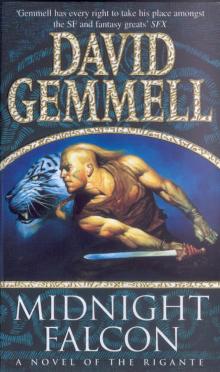 Midnight Falcon
Midnight Falcon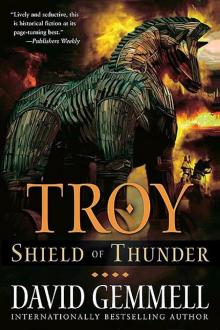 02 - Shield of Thunder
02 - Shield of Thunder In the Realm of the Wolf
In the Realm of the Wolf Ravenheart
Ravenheart The First Chronicles of Druss the Legend
The First Chronicles of Druss the Legend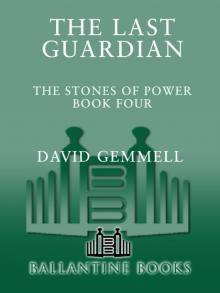 Last Guardian
Last Guardian Stormrider
Stormrider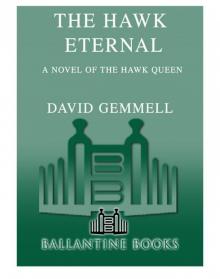 The Hawk Eternal
The Hawk Eternal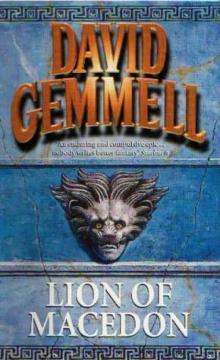 Lion of Macedon
Lion of Macedon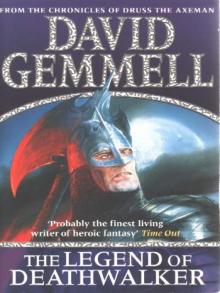 The Legend of Deathwalker
The Legend of Deathwalker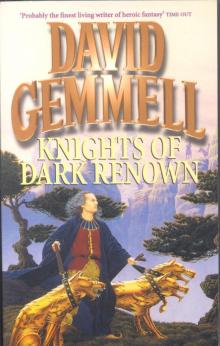 Knights of Dark Renown
Knights of Dark Renown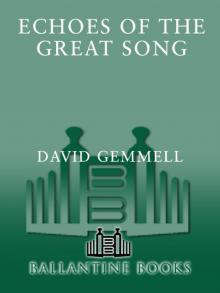 Echoes of the Great Song
Echoes of the Great Song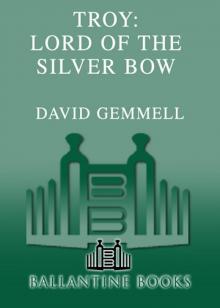 Lord of the Silver Bow
Lord of the Silver Bow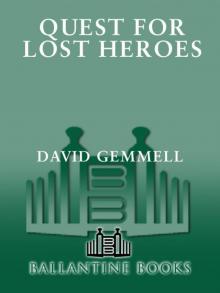 Quest for Lost Heroes
Quest for Lost Heroes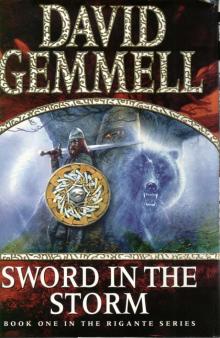 Sword in the Storm
Sword in the Storm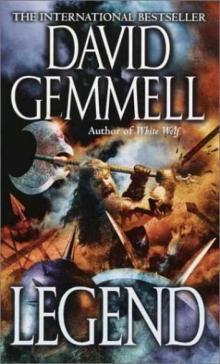 Drenai Saga 01 - Legend
Drenai Saga 01 - Legend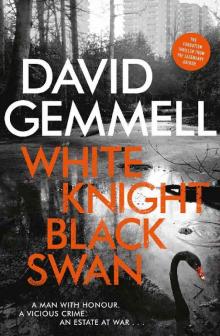 White Knight/Black Swan
White Knight/Black Swan![[Troy 02] - Shield of Thunder Read online](http://i1.bookreadfree.com/i/03/19/troy_02_-_shield_of_thunder_preview.jpg) [Troy 02] - Shield of Thunder
[Troy 02] - Shield of Thunder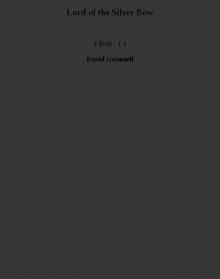 Lord of the Silver Bow t-1
Lord of the Silver Bow t-1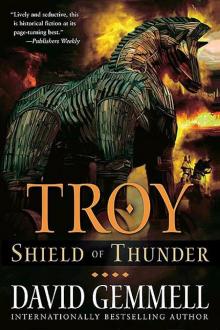 Shield of Thunder t-2
Shield of Thunder t-2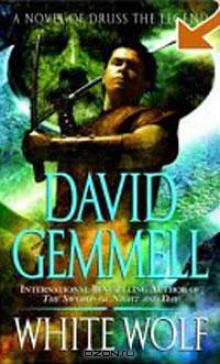 White Wolf: A Novel of Druss the Legend dt-10
White Wolf: A Novel of Druss the Legend dt-10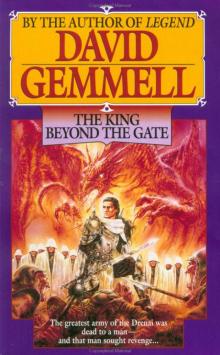 Drenai Saga 02 - The King Beyond the Gate
Drenai Saga 02 - The King Beyond the Gate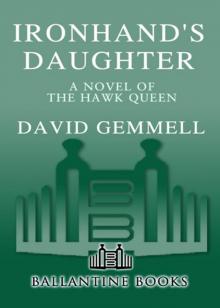 Ironhand's Daughter
Ironhand's Daughter Gemmell, David - Drenai 06 - The First Chronicles of Druss the Legend
Gemmell, David - Drenai 06 - The First Chronicles of Druss the Legend The Last Guardian
The Last Guardian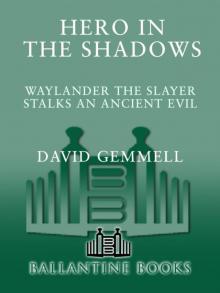 Hero in the Shadows: A Waylander the Slayer Novel
Hero in the Shadows: A Waylander the Slayer Novel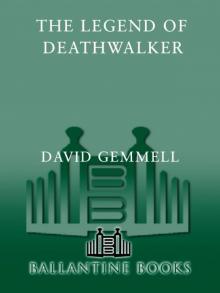 The Legend of the Deathwalker
The Legend of the Deathwalker